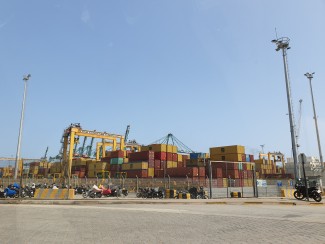Bhutan’s potato ‘stock market’ goes online
The beginnings of the New York Stock Exchange and the Royal Securities Exchange of Bhutan (RSEBL) may have more in common than you might expect.
The former started with a small group of merchants and brokers meeting in 1792 beneath a buttonwood tree in New York to trade only five securities. The latter was established in 1993 when the Bhutanese state divested shares in four state-owned enterprises.
“Both started with a small market and big ambition,” said Tshewang Dorji T, Enhanced Integrated Framework (EIF) National Implementation Unit (NIU) Coordinator at Bhutan’s Ministry of Economic Affairs.
With support from EIF and implemented by RSEBL, Dorji has been overseeing one of the Exchange’s most successful pilot initiatives – the Bhutan Commodity Exchange project – which has been focused on transitioning Bhutan’s traditional local potato auctions to an electronic trading system to increase price transparency and reduce transaction costs.
“Whether we like it or not, ecommerce is happening. We need to embrace it and try to maximize the benefits.”
Tshewang Dorji T, Enhanced Integrated Framework (EIF) National Implementation Unit (NIU) Coordinator at Bhutan’s Ministry of Economic Affairs
“Since we started the potato auction project in 2017, it has expedited the traditional potato auctioning process and increased the profit margin for Bhutan’s potato farmers by fetching an extra amount of US$330 per truckload,” said Dorji.
Potatoes are one of Bhutan’s top ten export items – the country exported potatoes worth USD$8.81 million in 2016, mostly to India.
After potatoes are harvested, they are transported by truck hundreds of kilometers through windy and steep mountain roads to one of three permanent auction yards located on the border between Bhutan and India. When at the auction yard, farmers will often have to wait hours in a queue to negotiate a price with a broker. Then, once a price is agreed on, it can take two to three days for the payment to be processed.
“This is time consuming and cumbersome,” said Dorji.
Towards the end of 2017, the Bhutan Commodity Exchange piloted its first online auction in the southern town of Phuntsholing, known as the heart of the Bhutanese economy. A big screen was installed in its auction yard and, for the first time, farmers and traders were able to view all the potatoes available for purchase that day, as well as the buy and sell rates.
“This made prices more transparent as everyone has access to a neutral reference price as well as demand and supply developments being readily reflected in price levels, and it has reduced transaction costs – it is easier to find buyers or supply through a centralized marketplace,” Dorji said.
It has also led to higher profits for farmers.
“Before, it was a one-to-one system where the buyer and seller were negotiating directly. Now, it is a one-to-many system, where if the sellers feel the buyer’s price is too low, they can just wait for a higher or lower price from another,” Dorji said.
“Farmers can be earning up to 30,000 Bhutan Ngultrums (US$420) more per truckload using the online platform than in the conventional method of auctioning,” he said.
The purchase of machines to grade the quality of potatoes (it sorts them by size and blemishes) has also seen potato prices climb.
“Sellers have greater trust in the quality of the potatoes they are buying when it’s been through the grading machine so they are willing to pay higher prices for them,” Dorji said.
Duba is one of 266 farmers who has used the online auction system. A farmer from Bhutan’s remote Khotakha village, where people depend on potatoes for their livelihood, Duba prefers the online auction because the payment system is prompt.
“Using the online payment system means payments are received the same day rather than farmers having to wait two or three days,” Dorji said.
1.25 million kilograms of potatoes (or 6% of potatoes sold in Bhutan) have already been sold in 2018 through the online auctions.
The participation of women in the online auction system has also increased.
“In 2017, there were no women participating. However, this year there were 40 women participating in the online platform. We are hopeful that next season, this will increase further as the online platform becomes more popular,” Dorji said.
Increasing the popularity of the online auction system is part of a Bhutan’s larger vision to embrace ecommerce.
“Whether we like it or not, ecommerce is happening. We need to embrace it and try to maximize the benefits,” Dorji said.
“However, there are many challenges. As most farmers are illiterate, it can be difficult for them to use the platform,” he said.
That is why the project has also had an educational component.
“We’ve visited villages in all potato growing areas of Bhutan to educate over 1,600 farmers about how to use the platform, the benefits of participating in the online auction, and address questions or concerns they may have,” Dorji said.
Another big challenge is establishing trust in a new system.
“Farmers are used to local cash-based economies where people do not have bank accounts. Encouraging people to see online transactions as safe and trustworthy may take time but we are confident that, over time, they will realize the full potential of adopting these new systems,” Dorji said.
Given the success of the pilot potato online auction, the next step is to roll out online auctions to potato auction yards across Bhutan.
“We would also like to develop an app so that potato farmers and traders can buy and sell direct from their mobile phones without having to leave their farms or offices,” Dorji said.
Cardamom is set to be the next commodity listed on Bhutan’s Commodity Exchange platform.
“There is huge potential and we intend to make the most of this opportunity,” said Dorji.
If you would like to reuse any material published here, please let us know by sending an email to EIF Communications: eifcommunications@wto.org.



